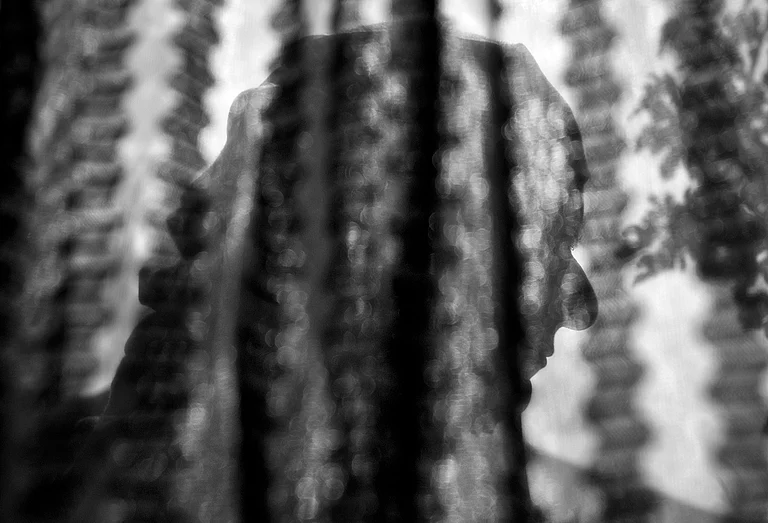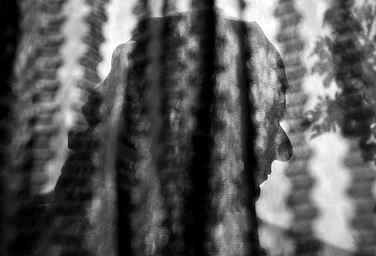IT could be an Indian version of a Well-sian vision: Krishnapur, a tiny hamlet in Midnapore district, West Bengal, is only four kilometres from the neighbouring village of Raikha. Yet, the two places exist in different centuries. In Raikha, Islamic clerics have declared a fatwa against radio programmes. Television, too, is out. What’s more, many of the residents fully support their religious mentors’ mission to resurrect a ‘more innocent past’, where such corrupting influences were nonexistent.
The time warp creates a sharp divide among the Muslims. Dr Ahsanullah Sarkar, owner of a medical hall at Krishnapur, is indignant about the fatwa. "We know nothing of this. I am sure it is the work of some fevered imagination," he told an Outlook team. "It seems a way to keep people in the dark." But once on the red, alluvial soil of the Sabhaghar cluster of villages which includes Raikha—90 km from the district capital Midnapore—the visitor might well be in a different age, a different land.
The first person one encounters is Zainal Abedin, a thin, bearded man with bright, piercing eyes. Giving the visitors a careful once-over, he confirms the fatwa. "The Shariat frowns on singing, dancing and other forms of entertainment. Naturally, our religious leaders have proscribed these. Is this so surprising?" he asks. By now a curious crowd has gathered.
Local tradition is quite explicit as to how visitors should be handled. The chief spokesman is Abdul Karim, the local Imam, a youngish, slightly built person who sports a thin Ho Chi Minh beard. After some initial hesitation, the Imam agrees to talk. "What we have here in the Raikha, Nischiridapur, Sabhaghar, Jadavbati Amsole and Dangar-para villages is not unusual. The fatwa is not new, it has been in vogue for years. There is often pressure on us to lift it, but the people who voluntarily live under the restrictions are far more than the dissenters. In any case, our people know the Shariat and understand the spirit of Islam," Karim explains. The crowd, impassive, listens. Very politely, he disallows the photographer from taking his picture. For, this requires the permission of the Chief Imam, Sadr Qazi Syed Mufti Maulana Mohammad Abdur Rahman, who is based in Midnapore.
After a while, the crowd becomes less wary and offers to take the visitors around the village. Only one house has a TV antenna on its roof. There are no signs of dish antennas, ubiquitous elsewhere in the state.
The offending antenna, apparently, will not be there very long. A young graduate, Nazrul Islam, had bought the set just prior to the recent Sahara Cup cricket matches between India and Pakistan. His decision had sent the elders into a huddle. Watching the game may not be haram, but the ads shown between overs, they felt, were decidedly frivolous and decadent, and depicted people in unorthodox postures which were definitely un-Islamic, besides being embarrassing for a family audience. The compromise was to turn the set off during the ads. And to ensure the restriction was complied with, a watch would be maintained.
The village elders are firmly convinced of the need for such strict measures. "Is it not generally admitted in the press and elsewhere that Doordarshan programmes are mostly Hindi film-based and often vulgar to the point of obscenity? So why should we watch all this trash? Even the ads these days copy such films," they complain.
But what about the fact that in West Asian countries, in Pakistan, Bangladesh and Malaysia, even cable TV is allowed? Pause. "Because some people somewhere do not follow the dictates of Islam sincerely does not mean that we should follow their example," the Imam answers with aplomb. The elders look satisfied, the younger ones impassive.
At this point, sounds of music reach the crowd. "That is a recording of the proceedings of the last congregation of the Furfura Sharif Urs gathering. There is no objection to these," someone explains.
The younger element, however, is not altogether happy. "True, there are norms and norms. But there is also a proper way of interpreting them. Some people may overdo things. We feel that a more liberal approach on these matters would have been preferable," said a young man, who requested anonymity. Throughout the tour of the village, few women were visible outside.
Incidentally, Raikha, by rural Indian standards, is not a particularly backward village. If anything, it’s fairly well-off. Rai-kha produces good quality rice and potato, and several other crops. It has a high school and even a college. Literacy here is high. The local panchayat is controlled by the CPI(M) and the BJP, too, has a sizable presence. The village has 1,400 Muslim and about 1,900 Hindu voters and there is no record of communal tension. Even the demolition of the Babri Masjid in 1992 hardly created a ripple in the area.
Yet, for the moment, the orthodox element holds sway. Said a young man: "When we protest against the restrictions, the standard question they put is: what do you lose by not listening to news broadcasts or watching entertainment programmes? That is difficult to answer. Then they ask, was there no progress before radio and TV arrived? What about the glories of Avicenna (Ibu Sina) and the glory of the Crusades?"
The return to Krishnapur is like a standing, audial leap into the ’90s. Radios blare (yes, rather vulgar) film songs from the local shops. The reaction of the people here to the diktats of their neighbours is one of amazement. "So it is true? Good God, how can this happen in our times? We hope that they have not imposed restrictions on other communities also," they mutter.
The frail, soft-spoken chief Imam of Krishnapur, Maulana Syed Abdur Rahman —who lives close to the famed twin mosques built by the forces led by Aurangzeb against his brother, the eastern Mughal chieftain Suza—seems to be the antithesis of his colleagues in Raikha. "I never declared a fatwa against listening to radio or watching TV. I have a TV and, yes, I watch it. There is nothing wrong in watching instructional programmes. I must visit Raikha and find out what is going on," says the 71-year-old Imam. In West Asia, he explains, most local programmes start and end with religious recitings and have a strong religious theme, but people do watch foreign networks, mostly on the sly. "There is a strong cultural wind blowing from the West and that is a fact," notes the Imam. Is Raikha listening in?






















